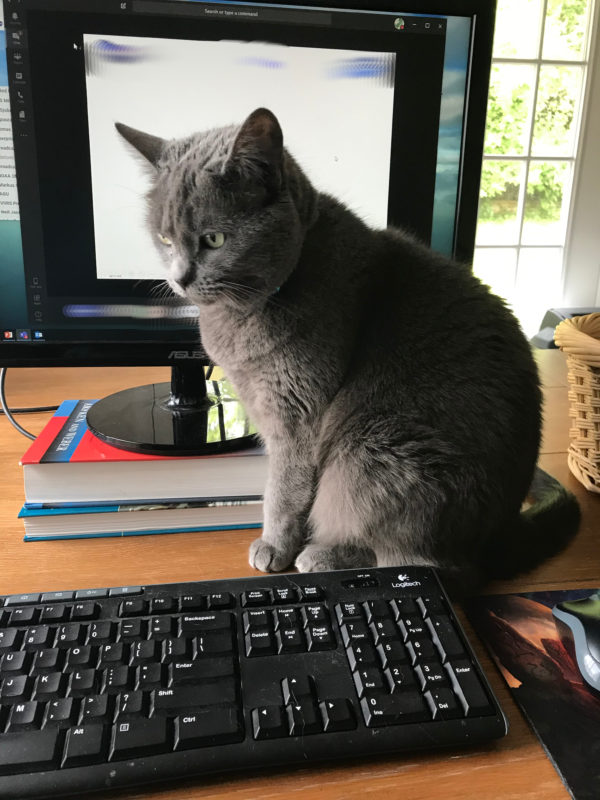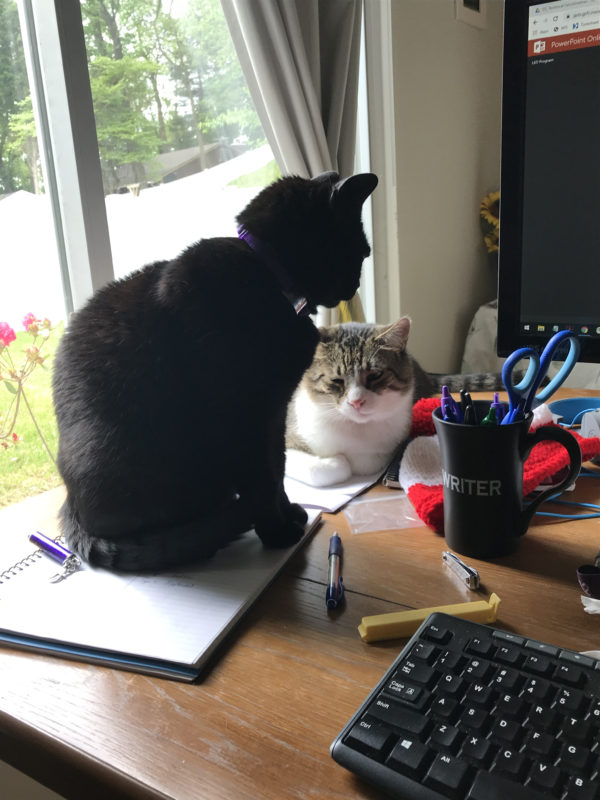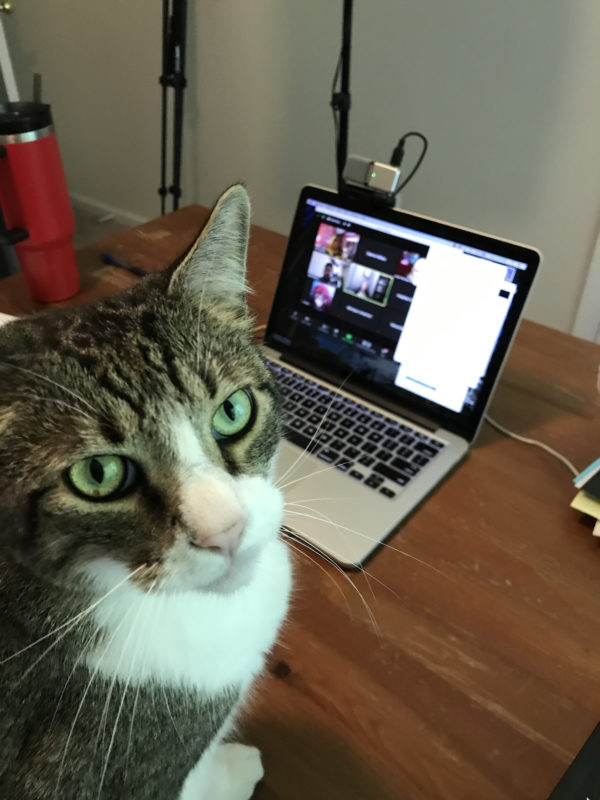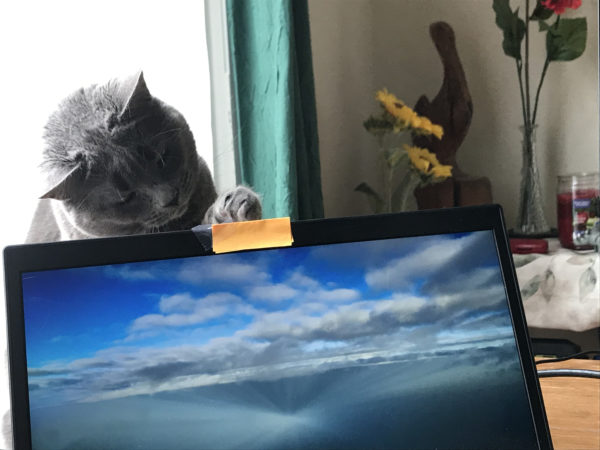
Welcome to my weekly Author Spotlight. I’ve asked a bunch of my author friends to answer a set of interview questions, and to share their latest work.
Today, V.J. Mikles (she/xie) is an astronomer turned systems engineer. Xie is active in community theater as an actor, choreographer, costumer, and stage manager. Xie also has a few youtube channels with short films and music videos, usually centering around asexuality or other queer content. Xie’s agender, aromantic, and asexual, and currently experimenting with pronouns. Xie lives in Maryland with xir three cats and works on weather satellites for NOAA.
Thanks so much, V.J., for joining me!
J. Scott Coatsworth: How long on average does it take you to write a book?
V.J. Mikles: It takes me about a year to go from concept to hitting publish these days, although I rotate projects, so I can get multiple books out in a year. 2021 is a 3-book year for me. From concept to first draft takes me about two months. Once I have a first draft, I usually let it rest and work on something else. I’ve been steadily whittling down my first draft queue, and have three drafts in my to-be-edited pile. I have half a dozen concepts and outlines in my to-be-written pile, because when I finish a book, I generally start jotting down all my ideas for the sequel.
JSC: Do your books spring to life from a character first or an idea?
VJM: My process is fairly fluid, but usually the setting is the first inspiration. A character springs from there, then I pair it with some of the ideas on my list of “wouldn’t this be cool to include in a story.” So many of my stories start with the where, and I’m usually several paragraphs in before I get to the who and the why. I call myself a discovery writer because I tend to discover what it’s all about as I write it.
JSC: What tools do you feel are must-haves for writers?
VJM: Something to write with. It’s easy to fall into the pit of purchasing and trying different tools, but writing is simple. My first books were written with pen and paper. I do everything in Word right now because it saves steps later.
My personal tools for concept and writing and editing include a MS Word, Excel, Google docs, Pages, a printer, a whiteboard, a clipboard paper, and pen.
For formatting, I use Vellum. For cover design, I use Gimp. For marketing scrapes I use KDSpy and Instant Data Scraper.
Another big must-have is writer friends. Ally yourself with other writers. Trade critiques, war stories, and intel. Learning to process multiple conflicting critiques from my writer’s group really gave me a perspective on how to respond to editor comments.
JSC: How do you approach covers for your indie stories?
VJM: Originally, I hired an artist. I learned the hard lesson that the artist will give you what you ask for… even if it’s not to market. As an indie person, it’s up to you to research the market and understand what to ask for on a cover.
So whether I’m buying or creating, my first step is to go to my genre and grab images of the best sellers and new releases in my category, and figure out the current trends in style, color, font, etc. There are usually a few different, unique trends to choose from (e.g. person-centric with scene behind, silhouetted person against vast backdrop, spaceship/scene, words as art).
Over the years, I’ve had to learn to let go of things like representing a scene, character, or object with perfect accuracy. Also, I’m moving away from capturing the more esoteric elements. “Once you read the book, the cover makes sense” doesn’t really work for cover design. The cover sells the book. Not the other way around.
Beyond that, I’ve discovered I really love playing with images and mixing elements in Gimp. I’m watching tons of tutorials and learning new tricks and techniques for making space scenes and backgrounds, making word art, and adding light elements. There’s a definite learning curve. In the middle of the pandemic, I decided to recover my series (7 books at the time). I thought it’d be a weekend project. It was not.
JSC: What was the hardest part of writing Ship Whisperer?
VJM: Not hard, but keeping realism in the military aspect required the most research. I’m not military and most of what I know about military organization comes from fiction. So I talked to every military person I knew, learned about the command structures, ranks, weapons, how squads, units, and companies are structured. I took a workshop at Rainbow Space Magic Con, and I enlisted a beta-reader with military experience.
The biggest challenge was striking a balance in emotional content. On the one hand, your soldiers have sufficient training to keep from panicking under pressure, but your readers need to feel a certain level of panic in the narration to maintain tension. I love what ultimately came out of that research and iterative editing.
JSC: What pets are currently on your keyboard, and what are their names? Pictures?
VJM: The pets don’t sit on the keyboard. They peer at me forlornly, begging me to close the laptop so they can sit on me. They come between me and the computer screen. They sit on my notes. Their names are Hawk, Sky, and Chase, after three characters in my New Dawn series. Hawk was named by his foster parent, and he definitely got adopted because of his name.
JSC: We know what you like to write, but what do you like to read in your free time, and why?
VJM: Thrillers and mysteries. Bonus points if they’re in a sci-fi setting, but they so rarely are. I also love sci-fi humor. Yahtzee Crowshaw is an author I discovered recently that made me look forward to reading so much. Mystery and humor are just so difficult for me to write, and I love reading authors who do it well. It’s so impressive.
JSC: Would you visit the future or the past, and why?
VJM: Future. Always the future. I’m hoping there will be less misogyny and cures for everything. I feel like history is over-romanticized, and maybe the future is too, but we won’t know until we get there.
I’d make an exception for an expedition in a time-traveling research spaceship (with self-contained modern amenities or better) to tourist points in the past. I’d particularly like to see the different types of proto-humans and a pterodactyl.
JSC: What’s in your fridge right now?
VJM: This morning, I watched Valerie Bertinelli make pot stickers, so I went to the grocery store and bought ingredients for pot stickers: cabbage, scallions, cilantro, wonton wrappers, ginger, garlic, sesame oil, and ponzu. I’ve also become a fan of fennel and potatoes. I have half a bulb of fennel left. I have a recipe blog that shows what I do with my ingredients when I’m not watching food network: https://nodairynosubstitutes.wordpress.com
Since I generally can’t have dairy and I hate thinking about food all the time, the blog helps me cope.
JSC: What are you working on now, and what’s coming out next? Tell us about it!
VJM: The moment I finished Ship Whisperer, I wanted to write the sequel, so that got outlined. However, I am one book away from finishing my New Dawn series, and I am taking October to do a rewrite on my first draft of that. I’m super-excited to bring the series to a close, coming full circle and fulfilling the promises I set up in Book 2. It’s insane because my writing style and technique has come so far since I first penned the book, and it’s a challenge to stay true to the voice of the series. I have changed so much as a person and a writer, and I’m looking forward to ending on a strong note. I’m hoping both books will be out by the end of next year.
And now for Valerie’s new book: Ship Whisperer:
When Tabitha whispered to the ship, she never expected it to answer.
A pilot yearning for adventure, Tabitha proudly flies missions scavenging supplies for her space-borne city. But when the Navicorp sends her to scavenge a derelict ship, it triggers a psychic link to the ship and the alien enemy that drove her people from their home planet. The unexpected connection puts Tabitha and her people in the crosshairs of the telepathic invaders who are determined to exterminate the human race.
Her rapidly evolving ability to communicate with the alien ship unlocks a chain of secrets about her past that shakes her identity. The Captain’s eagerness to push her into danger challenges her loyalty. Can she use her new ability to save them? Will they turn on her and leave her at the mercy of the aliens?
If you love technopaths, psychics, AI friends, and thrilling heroics, you’ll love this military sci-fi adventure. Pick up this page-turner today.
Ship Whisperer is a military sci-fi space opera about a non-binary space marine who develops an ability to talk to an alien spaceship.
Get It On Amazon
Excerpt
Seventy years ago, aliens invaded Earth-2. The human race has been running ever since.
The hum of the space-borne city filled Lieutenant Tabitha Chiu’s ears, and the air vent overhead shot a constant breeze that tickled her skin. Her feet sank into the half-inch blue and gray mats on the floor that rumbled underfoot as the surviving colony jetted through the outer solar system. Although the survivors had evaded war for decades, the Navicorp dutifully trained for a battle they hoped would never come.
Tabitha clicked her tongue to the rhythm of a song that played in her head, staying light on her feet as she sparred with her lifelong friend, Commander Ryo Takumi. She could tell Ryo was going for a jab, and she arched back. The jab didn’t come as quickly as she’d expected. Rather than dodging, she was forced to take a step.
“Tabs, Tabs. You’re anticipating,” Ryo teased, a glint in his eye and a gravelly rasp in his tenor voice. His nagging reminder was just part of the choreography.
“It’s hard not to when your tells are so transparent,” Tabitha said, dodging again, brushing against the striped, blue mats padding the walls. After a decade of training together, very little surprised her in hand-to-hand combat drills. She could have taken Ryo down minutes ago, but she liked the game. “If you want to stop—”
Ryo dropped, sweeping his foot out, swiping at Tabitha’s prosthetic leg. She hopped out of the way, kicking the back of his knee.
“You think I need two legs to take you down?” Tabitha jeered. “Next session I go one leg and you tie your ankles together.”
“Yammer, yammer,” Ryo panted, attacking again. “Stop chattering and focus.”
“It’s easier to focus when we get a banter going,” Tabitha said, side-stepping, pulling him off balance and throwing him to the mat.
“I’m not giving you the satisfaction,” Ryo huffed as he rolled to his feet. “Not after you yawned at me.”
“Sorry, Ryo, but your kid’s first trip to the library is a yawn-worthy story,” Tabitha said. The song in her head changed from a happy tune to a sad one, and she felt guilty for dismissing his family life. “Tell it again. I might get drowsy enough for you to get the upper hand.”
“You’re trying to distract me.”
“Just giving you a chance to breathe, oh wise one. You’re the youngest executive officer the Nav has had in half a century, but I swear the last two months have aged you twenty years,” she said.
“Burden of command. Too many meetings. Too many secrets.” His eyes and shoulders dropped, and for a moment, she could see the pain he was holding in. He didn’t mention the stress of parenthood or his recent divorce. She’d eye-rolled and yawned enough that he’d stopped sharing, and now she felt bad that she’d silenced him. It wasn’t the kind of banter she wanted when they sparred, but this was the only time they had together anymore.
As a romantic asexual, his love life had come with certain challenges, but he claimed it was the promotion that had been the final stressor that broke his marriage. Watching him go through the ups and downs of a long-term relationship only highlighted how non-existent her own love life had been.
“At least the captain still lets us train together,” she said.
“There’s no one else who would put up with you,” he said, putting his hands on his knees to catch his breath.
“It’s the Nav, Ryo. You’re XO now. You assign someone to put up with me,” she said, leaning forward and putting a hand under his chin. A lot of qualified candidates with more years of service had been passed over for him to get his position, and he was convinced some were trying to sabotage him. “I’m not that antagonistic, am I?”
Ryo chuckled and pushed her fingers off his chin, giving them a squeeze before letting go. “You really want me to answer that?”
“If you’re that stressed for time, let’s call this session early. You can go see your kids,” she offered, bouncing on her heels, hating the thought of losing what little time she had with him.
“You surrender?” he asked, throwing a weak left hook.
“Never,” Tabitha said, rolling under the hook, bumping his torso with her shoulder to let him know he’d left himself open. “But seriously, Ryo. We’re on an island in the middle of nowhere. The Nav hasn’t seen live combat in a century. When are we ever going to use—”
The song in Tabitha’s head stopped, and she heard a click over the whir of the door opening. Sensing danger, she plowed into Ryo, knocking him out of harm’s way. Ryo grunted as they slammed into the equipment table, sending gloves and equipment clattering to the ground. He swore as a bullet whizzed over their heads.
Her conscious mind caught up with her instinct, and her heart rate skyrocketed. Someone had come in shooting.





